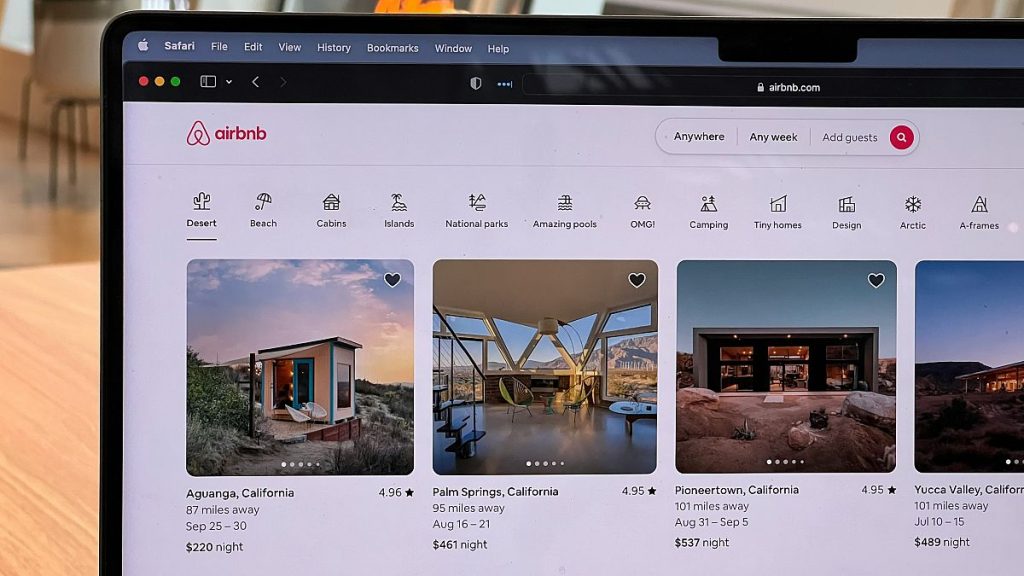Airbnb, a global leader in the vacation rental market, is navigating a complex landscape of growth, criticism, and strategic shifts. While the platform has experienced increased bookings, particularly in the summer of 2024, it faces growing concerns regarding its role in overtourism and the displacement of local residents in popular destinations. This tension has led the company to re-evaluate its approach, focusing on refining its property listings, enhancing the user experience, and exploring new avenues beyond accommodation rentals.
The company’s recent financial performance reveals a robust growth trajectory. Bookings surged by 8% in the 2024 summer quarter, reaching 122.8 million. This upward trend is further bolstered by a growing preference for mobile bookings, indicating an increasingly mobile-savvy user base. Recognizing the importance of user experience, Airbnb has implemented over 50 app upgrades since October 2023, aiming to personalize the platform and cater to first-time users, a demographic that has shown significant growth. The expansion of local payment options has further contributed to the platform’s accessibility, allowing users in countries like Vietnam, Denmark, and Poland to transact in their native currencies. This strategy reflects Airbnb’s commitment to localizing its services and enhancing relevance across diverse markets. By spring 2025, the company anticipates offering nearly 40 local payment methods across five continents, solidifying its global reach.
In response to criticisms regarding the quality of listings, Airbnb has taken steps to curate its offerings more rigorously. Over 300,000 “low quality” properties have been removed from the platform, addressing concerns about subpar accommodations and unrealistic host demands. This proactive approach aims to improve guest satisfaction and maintain the platform’s reputation. Furthermore, Airbnb is actively working to mitigate cancellations by hosts, recognizing the disruptive impact on travelers’ plans. While cancellations remain relatively infrequent, the company acknowledges their significance as a “pain point” and is committed to finding solutions.
Looking beyond its core accommodation business, Airbnb is signaling a strategic expansion into new territories. While details remain scarce, the company has hinted at moving “beyond accommodation” in 2025. This move could revitalize the “Airbnb Experiences” program, which offers curated activities like local tours and excursions. Although the initial launch of Experiences in 2016 failed to gain significant traction, leading to a halt in new host sign-ups last year, the company may be considering a relaunch with a broader scope. Speculation suggests the revitalized program could target local communities in addition to travelers and possibly incorporate ticket sales for major attractions, transforming Airbnb into a more comprehensive travel platform.
Furthermore, this expansion could involve integrating additional services with existing property rentals. Imagine booking a villa and simultaneously arranging for in-home experiences such as massages, private chef services, or personalized cooking classes. Such offerings could significantly enhance the guest experience, creating a more holistic and personalized travel journey. By blurring the lines between accommodation and experiences, Airbnb could carve out a unique niche within the travel industry, appealing to a wider range of traveler preferences and needs.
This strategic diversification comes at a crucial juncture for Airbnb. While the platform continues to enjoy robust growth, it must address the challenges posed by overtourism and its impact on local communities. By focusing on quality control, enhancing the user experience, and exploring new service offerings, Airbnb aims to solidify its position as a leading player in the travel industry while mitigating the negative externalities associated with its growth. The success of this strategic pivot will depend on the company’s ability to balance its expansion ambitions with the needs and concerns of the communities it serves. Furthermore, Airbnb must navigate the competitive landscape and effectively differentiate itself through innovative offerings that cater to the evolving demands of travelers. The coming years will be critical in determining whether Airbnb can successfully transform itself from a primarily accommodation-focused platform into a more comprehensive travel ecosystem.


